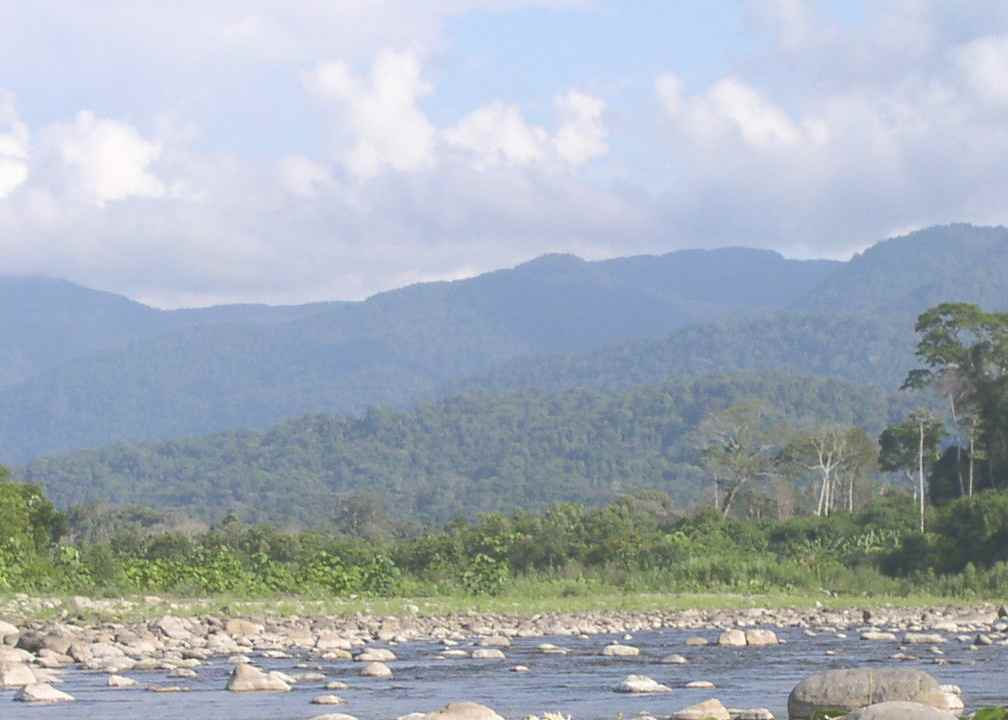 Cabeceras Aid Project
Cabeceras Aid Project Cabeceras Aid Project
Cabeceras Aid ProjectClick here to download this Update as a printable PDF (1.4MB)
Dear Friends,
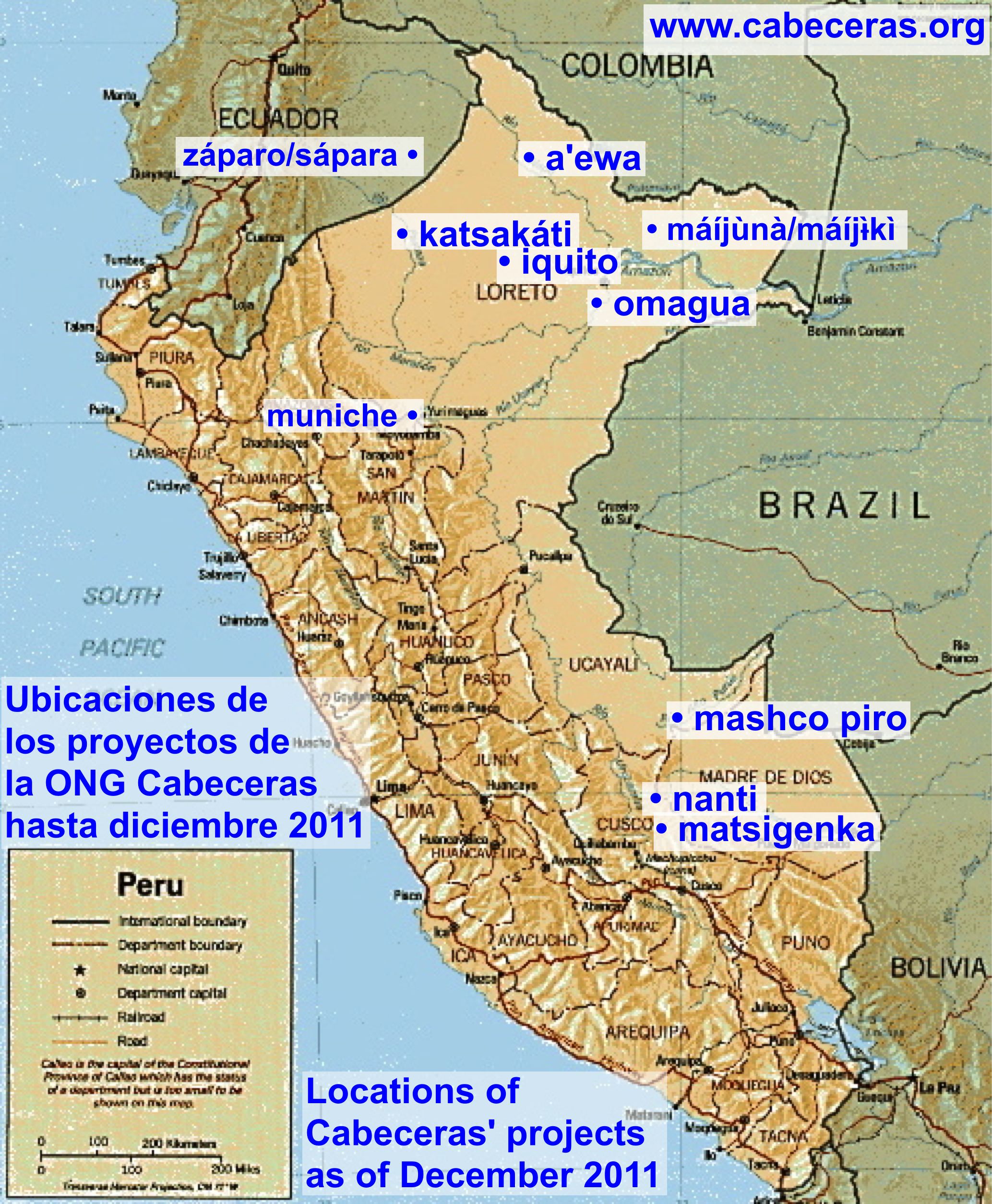 As always, it is an honor to write to you and bring you up to date on Cabeceras Aid Project's recent accomplishments and forthcoming activities.
As always, it is an honor to write to you and bring you up to date on Cabeceras Aid Project's recent accomplishments and forthcoming activities.
In many ways, 2011 was unlike any previous year in our organization's history. In fact, this year has ushered in a new chapter in our organization's lifetime, as we shift our focus from funding research projects and hand-delivered medical and material aid packages to investing in some longer term strategies to support the well-being and self-sufficiency of indigenous communities in Peruvian Amazonia. At this juncture, our key strategy is to support the education and professionalization of a small group of indigenous individuals, each of whom has a clear commitment to serving their home communities through their chosen professions. Below, I'll provide more detail on why and how Cabeceras has arrived at this new phase.
Before saying more, though, as 2011 draws to a close, I'd like to invite you to make a donation to Cabeceras' Nathaniel Gerhart Memorial Scholarship Program, which is our program most in need of your support this year (see below for details). Thank you so much for your support over the years!
![]()
Christine Beier
Fieldworker, Secretary and Treasurer
Cabeceras is 15 years old! A brief glance back . . .
On October 16th of 2011, Cabeceras Aid Project celebrated 15 years since its founding and incorporation. Wow! When I look back on those 15 years, I am amazed by, and proud of, what we have been able to accomplish, thanks to the ongoing support of caring and generous people like you. Since 1996, Cabeceras' fieldworkers have worked with, or on behalf of, Nanti, Iquito, Matsigenka, Máíhùnà, Omagua, Muniche, Mashco Piro, Katsakáti, A'ewa, and Sápara people and/or communities, carrying out humanitarian aid and research projects that have supported these groups' well-being, self-determination, and cultural and linguistic survival. We have sometimes focused on healthcare, sometimes on language documentation and revitalization, sometimes on broader issues of education, and sometimes on land rights, depending on each particular situation, but we have always oriented our work toward supporting the perspectives and objectives of our indigenous counterparts as they themselves represent them.
. . . taking stock . . .
Over the years, Cabeceras has relied principally on two fieldworkers: Lev Michael and me, Chris Beier. When Lev and I founded Cabeceras Aid Project, we hadn't even begun graduate studies in linguistics or anthropology; it was our commitment to humanitarian projects that could be supported by solid cultural and linguistic research that led us to graduate school, not the other way around!
Fifteen years later, Lev and I have both finished our doctorates (in Linguistic Anthropology at the University of Texas at Austin) and we now find ourselves in greatly changed circumstances. In particular, since graduating in 2008, Lev has been an Assistant Professor in the Linguistics Department at the University of California, Berkeley. Lev's position at Berkeley has made a tremendous difference in how we can design and fund our community-based projects. Lev's impressive ability to obtain research grants for language documentation fieldwork, together with the outstanding graduate and undergraduate students he has drawn into his field projects, have resulted in a substantial decrease in the need for Cabeceras to fund community-based research projects.
That change has dovetailed with our radically altered circumstances in southeastern Peru. As we reported last year, large-scale political changes in Peru have resulted in our inability to gain legal access to the national reserve where the Nanti communities of Montetoni and Marankejari are located, such that our relationships with the Camisea Nanti people have in effect been suspended indefinitely. Therefore, to our great sorrow, Cabeceras will not be returning to the Urubamba River Valley in the next few years.
. . . and a glance toward the future.
Taking into consideration these two major changes — the feasibility of doing community-based projects primarily funded by research grants rather than by Cabeceras, plus our inability to work with the Nanti communities — Cabeceras' board has chosen to direct our focus toward longer-term strategies that will benefit indigenous communities in the regions where we have worked. To that end, we are growing our scholarship program, with the aim of supporting the development of indigenous professionals who will be able to serve their communities 'from the inside' over the entire course of their careers.
The Nathaniel Gerhart Memorial Scholarship Fund
As you may recall, beginning even in our early years, Cabeceras has given small scholarships to a few highly motivated indigenous individuals in Peruvian Amazonia for their continuing education. Such scholarships are a concrete way to cultivate individual talent that can later bear substantial fruit for indigenous groups and communities on a larger scale.
In 2007, we took a major step forward in our commitment to adult education for indigenous individuals, through the establishment of the Nathaniel Gerhart Memorial Scholarship Fund. That fund has enabled us to provide more substantial, on-going support to each awardee than we could before.
Then, in 2010, we chose a special focus for our Scholarship Program: supporting Matsigenkas in the healthcare professions. For many years, Cabeceras provided direct medical aid to a number of Matsigenka communities, and we saw the scholarship program as a fitting way to deepen our commitment to the health and well-being of the Matsigenka people. We are very enthusiastic about this focus, because it has the long-term potential to substantially improve the quality of healthcare that Matsigenka communities will receive, once these Matsigenka healthcare professionals are able to work within the Peruvian healthcare system.
All together, our Fund has supported five individuals in different ways since 2007, and we will be continuing to support the following three worthy awardees through 2012.
• Alex Rodriguez Roque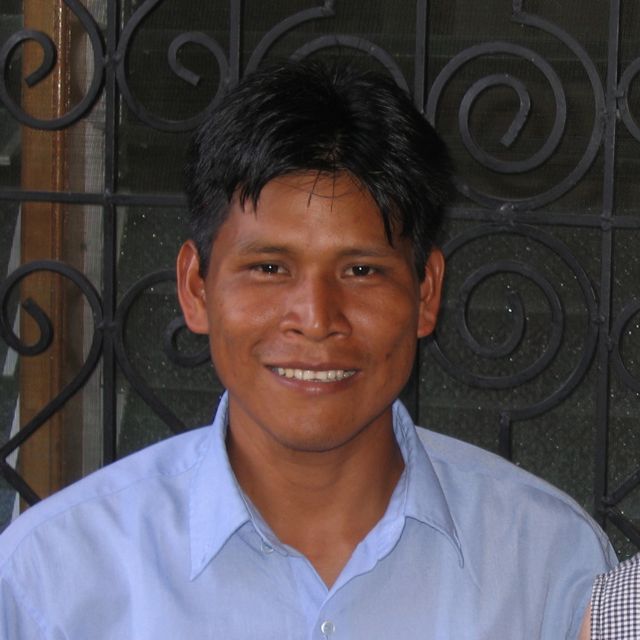
Cabeceras' Scholarship Fund began supporting its first awardee, Alex, in 2008. Now 32, Alex is a native speaker of Bora and Spanish, and is from the Bora community of Pucaurquillo in Loreto. Already an experienced school teacher and primary school director, Alex had begun studying law in Iquitos at his own expense before he obtained longer-term financial assistance from Cabeceras. A person of exceptional integrity, intelligence, and humility, Alex is becoming a lawyer in order to defend and improve the civil rights of indigenous individuals and communities in Loreto. Now in his eleventh of twelve semesters, Alex is making excellent progress toward his degree.
• Maribel Kaibi Omenki 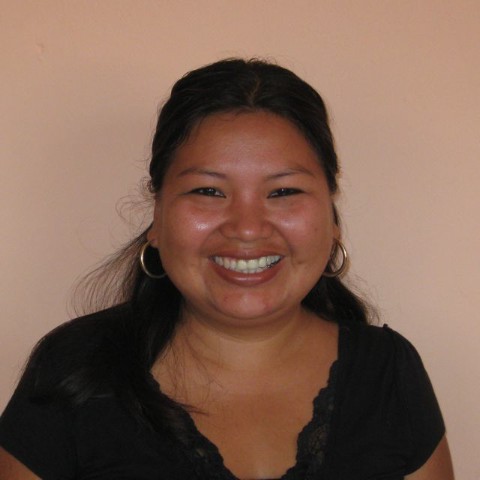
Maribel, 35, is from the Matsigenka community of Koribeni in the state of Cusco, and is one of our new Matsigenka awardees. Fluent in Matsigenka and Spanish, Maribel already has technical training in Nursing and is now beginning her studies to obtain her professional title and license as a nurse. A kind, affable, and patient person, Maribel is well-suited to the Nursing profession, and already has considerable experience providing healthcare in small indigenous communities, both throughout Matsigenka territory and beyond. Since August of this year, she has been taking a university preparatory course in Cusco and will be applying to the Universidad Tecnológica de los Andes in March of 2012. We are delighted to be able to support Maribel's continuing education!
• Rober Metaki Cárdenas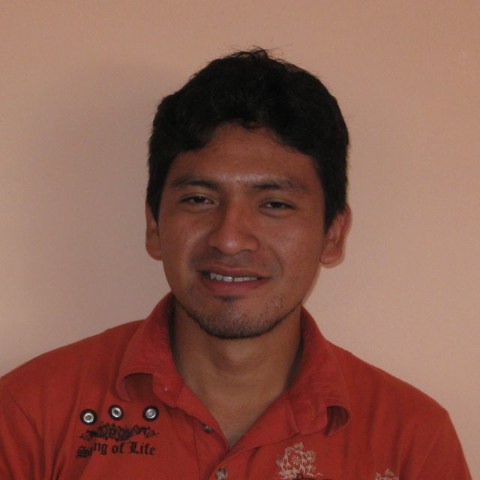
Rober, 24, from the Matsigenka community of Poyentimari in the state of Cusco, is our other new Matsigenka awardee. Fluent in Matsigenka and Spanish, Rober also already has technical training in Nursing, as well as a track record of service to the Matsigenka people. Rober is sensible, optimistic, hard-working, and very committed to his professional path. This past September, he began studying Clinical Laboratory Technology at the Universidad Alas Peruanas in Cusco, and is adapting well to his radically new social and intellectual environment. We are delighted to be able to support Rober in his studies!
Good 'support' is more than just money
Although the monetary costs of higher education in Peru are in general much lower than in the United States, the complex social, economic, and logistical circumstances that indigenous individuals face are daunting and usually prohibitive. Therefore, in addition to providing financial support, Cabeceras is providing personalized mentorship to each of our awardees, in order that they be able to successfully handle all the different kinds of challenges that arise as they continue their formal education. This includes, for example, frequent conversations and chats with me via Skype and gmail, so that we stay in close touch as they progress — isn't modern technology wonderful?
Again this year, we gratefully acknowledge the financial support of the Nathaniel Gerhart Memorial Fund in New York for helping our scholarship program grow. Thank you so much!
Cabeceras' Field Projects
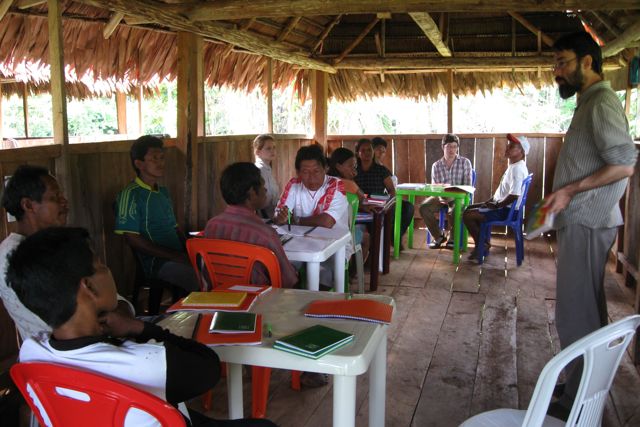 In 2011, Cabeceras' fieldworkers were involved in three major community-oriented field research projects — but at little or no financial cost to Cabeceras, thanks to research grants secured by the project teams!
In 2011, Cabeceras' fieldworkers were involved in three major community-oriented field research projects — but at little or no financial cost to Cabeceras, thanks to research grants secured by the project teams!
First, the Záparo Rapid Documentation Project (ZRDP) took place from December to January, and then again from May to July, co-directed by Dr. Brenda Bowser at California State University, Fullerton, and primarily funded by the National Science Foundation's Documenting Endangered Languages Program. Next, the Matsigenka Documentation Project was carried out by Lev and me between January and May, and was primarily funded by the Hellman Faculty Fund at UC Berkeley. Finally, the Máíhìkì Project was carried out between June and August, also primarily funded by the NSF's Documenting Endangered Languages Program. As always, we built each one of these projects upon a commitment to producing written and recorded cultural and linguistic materials designed to serve members of these communities over the long term, as they see fit.
Both the Matsigenka Project and the Máíhìkì Project are multi-year projects, each with its own source of funding, with the result that Cabeceras needs only to provide fieldwork time, not financing! This turn of events was a key motivation for our organization's current shift in focus toward developing our scholarship program.
(Photo at right: Teaching Máíhùnà community members how to do linguistic description in Nueva Vida, July 2011.)
A few organizational changes
Cabeceras recently changed its registered office from the home of board member Robin Gerrow in Austin to the home of board member Margo Minogue-Heyl in Houston. Because of the long stretches of time that I spend in Peru, housing our office has included a commitment to managing Cabeceras' business in my absence, and I want to thank Robin for all that she has done over the last eight years for our organization! Heartfelt thanks as well to Cynthia Anderson Hansen, who shared 'deputy' duties in Austin over the last few years. Last but not least, sincere thanks to Margo for all that she is doing and will continue to do for Cabeceras as our new Deputy Treasurer and Secretary.
Please make a donation to Cabeceras this year!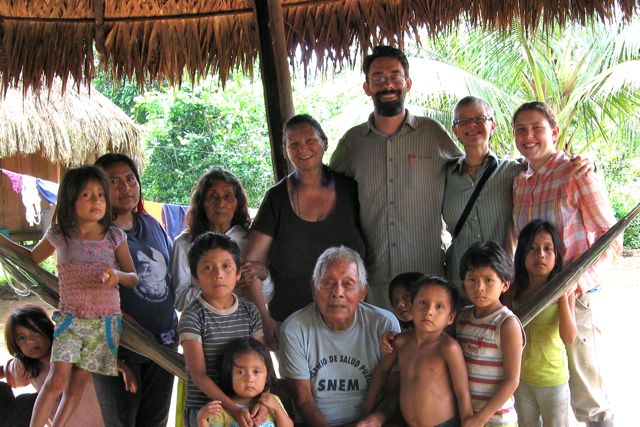
As 2011 comes to an end, we ask you to make a contribution to our scholarship fund. We are a 501(c)(3) organization, so your donation is tax-deductible. Our Tax ID number is: 74-2799387.
You may send a check to:
Cabeceras Aid Project
5859 Braesheather Drive
Houston TX, 77096-3933
Or you may donate online using a credit card:
Just click the ''Donate Now'' button below to make a secure donation through Network for Good:

(Photo at left: ZRDP team members Julia Pichura (back row, far left), Brenda Bowser, Lev, Chris, and Vivian Wauters (all in back row) with Sápara speakers Ana María Santi (between Julia and Brenda) and Cesario Santi (seated in hammock) in Jandiayacu, Ecuador, June 2011.)
Thank you so much for your ongoing support!
Gracias! (Spanish)
Kameti! (Nanti)
Kametitake! (Matsigenka)
Jaari tii! (Iquito)
Deira ja! (Máíhìkì)
Yuse! (Muniche)
 Last updated: 12 December 2011
Last updated: 12 December 2011